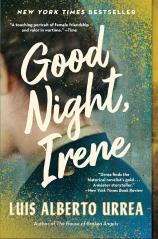Good Night, Irene
Review
Good Night, Irene
The Tucson Festival of Books is a literary celebration held annually on the campus of the University of Arizona. For more than a decade, it has been a joyful gathering of readers of all ages --- from the very young to the older people of my generation. The two days are packed with events and discussions by countless writers.
One of the joys of the festival comes when an author you are not familiar with appears on a panel with others you have previously read. This happened to me several years ago when I was introduced to Luis Alberto Urrea, who was discussing THE DEVIL’S HIGHWAY, a nonfiction account of individuals crossing the U.S.-Mexico border, which one review stated was "the single most compelling, lucid, and lyrical contemporary account of the absurdity of U.S. border policy." Meeting Urrea expanded my reading to subjects I had never considered.
"Urrea’s talent makes GOOD NIGHT, IRENE a beautiful account of World War II and the generation that saved democracy. Hopefully it serves as an inspiration to us all."
Shortly thereafter, I had the opportunity to read his novel, THE HOUSE OF BROKEN ANGELS, in which an immigrant family is marking both a funeral and the 70th birthday of their eldest son. It included many flashbacks to La Paz and Tijuana, and reminded readers of two things: the life experience of immigrants is similar regardless of what countries they come from, and immigrants arrive here from around the world, not just the European continent.
GOOD NIGHT, IRENE, Urrea’s latest novel, is entertaining and unique. It revolves around two women who volunteer to serve in World War II as “Clubmobilers,” driving military trucks across the battlefields of Europe and serving coffee and donuts to soldiers. Urrea’s mother, Phyllis McLaughlin, joined the Red Cross in 1943 and served in Europe as a Clubmobiler. In his author’s note, Urrea observes that “[s]ometimes a fable is the surest way to see the truth of the past. In writing this story, I found the wild and heroic woman she was before I came into this world.”
Irene Woodward and Dorothy Dunford are “Donut Dollies,” whose contribution to the war effort is to provide camaraderie and a taste of America to the troops. As the battles rage, Irene and Dorothy see the war firsthand. Urrea’s mother shared some of her World War II experiences with him, and they serve him well here. Originally Urrea wanted this book to be nonfiction, but that was impossible as the records of these women’s activities were destroyed in a fire in the 1970s.
The list of novels covering World War II is extensive, but GOOD NIGHT, IRENE adds an element that is different from most of these works. Irene and Dorothy certainly experience the travails of combat, but they are not combatants in the true sense of the word. Their real service is something that we might find inappropriate these days. Their faces and voices, not to mention the comfort they provide, were considered important to the men fighting the war.
Urrea tells Irene and Dorothy’s story in moving and emotional fashion. It took many veterans quite a long time to openly share their experiences, and now it is probably too late. Perhaps we are left with only the tales that novelists rather than historians will produce. Urrea’s talent makes GOOD NIGHT, IRENE a beautiful account of World War II and the generation that saved democracy. Hopefully it serves as an inspiration to us all.
Reviewed by Stuart Shiffman on June 16, 2023
Good Night, Irene
- Publication Date: June 4, 2024
- Genres: Fiction, Historical Fiction
- Paperback: 432 pages
- Publisher: Back Bay Books
- ISBN-10: 0316265950
- ISBN-13: 9780316265959




